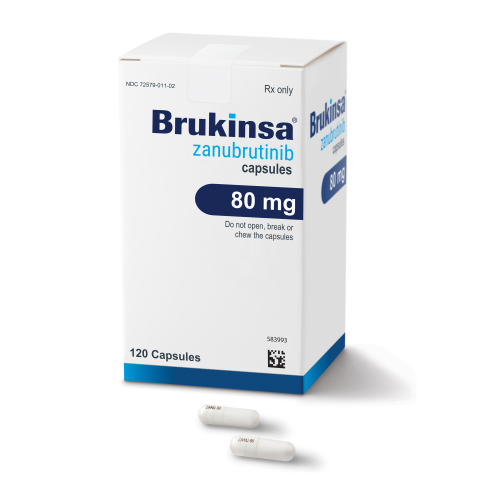CAMBRIDGE, Mass. & BEIJING– BeiGene (NASDAQ: BGNE; HKEX: 06160), a global, science-driven biotechnology company focused on developing innovative and affordable medicines to improve treatment outcomes and access for patients worldwide, today announced that BRUKINSA® (zanubrutinib) has been approved in Australia for the treatment of adult patients with Waldenström’s macroglobulinemia (WM) who have received at least one prior therapy or in first line treatment for patients unsuitable for chemo-immunotherapy.1 Following registration of BRUKINSA with the Australia Therapeutic Goods Administration (TGA), these patients will have immediate access to BRUKINSA through a BeiGene sponsored post-approval, pre-reimbursement access program.
In addition, BRUKINSA recently received approval from the Singapore Health Sciences Authority (HSA) for the treatment of adult patients with mantle cell lymphoma (MCL) who have received at least one prior therapy.
“BTK inhibition is an established mode of treatment for patients with WM, and the ASPEN trial showed that BRUKINSA is highly effective and has improved tolerability compared to the first-generation BTK inhibitor,” said Professor Con Tam, MBBS, M.D., Disease Group Lead for Low Grade Lymphoma and Chronic Lymphocytic Leukemia at the Peter MacCallum Cancer Centre and a principal investigator on the BRUKINSA clinical program. “BeiGene first began clinical trials of BRUKINSA in Australia in 2013, and since that time, many Australians have benefitted from treatment as part of ongoing clinical studies. We hope this therapy will offer new hope for people living with WM in Australia.”
In Australia, more than 6,000 people are diagnosed with non-Hodgkin’s lymphoma (NHL) each year, making it the sixth most common cancer in adults.2 WM is a rare, slow-growing lymphoma that occurs in less than two percent of patients with NHL.3 The disease usually affects older adults and is primarily found in the bone marrow, although it may also impact lymph nodes and the spleen.3
“While WM is a slow-growing lymphoma, not all patients fully respond to existing therapies and many discontinue treatment due to side effects,” commented David Young, the National Team Leader at the WMozzies. “We are pleased to hear that people living with WM in Australia will have immediate access to this next-generation BTK inhibitor that has demonstrated clinical benefit with potential to improve treatment outcomes.”
BeiGene has submitted for reimbursement of WM to the Australia Pharmaceutical Benefits Advisory Committee (PBAC). In a first for the PBAC, BeiGene expects to enter a facilitated resolution pathway in order to seek a listing date for the WM indication.
“BRUKINSA has been shown to induce deep and durable responses with reduced off-target side effects, suggesting improved clinical benefit compared to standard BTK inhibitor therapy,” said Jane Huang, M.D., Chief Medical Officer, Hematology at BeiGene. “We are grateful to the Australian investigators, patients and families who participated in clinical trials contributing to TGA approval. Our ability to offer BRUKINSA to people in Australia impacted by WM is another step toward fulfilling our goal of increasing affordable access to oncology medicines around the world.”
“This approval in Australia, and our recent approval in Singapore, represent BRUKINSA’s continued expansion in the APAC region,” added Adam Roach, Vice President and Head of Commercial for APAC (ex-Greater China) at BeiGene. “We have been building commercial teams in these markets to support our goal of bringing this potential best-in-class BTK inhibitor to patients who need them globally.”
The Australian registration for BRUKINSA in WM is based on efficacy results from the ASPEN clinical trial, a Phase 3 randomized, open-label, multicenter trial (NCT03053440) that evaluated BRUKINSA compared to ibrutinib in patients with relapsed or refractory (R/R) or treatment-naïve (TN) WM who harbor a MYD88 mutation (MYD88MUT). In the ASPEN trial, BRUKINSA demonstrated a numerically higher very good partial response (VGPR) rate (28.4%, 95% CI: 20, 38) compared to ibrutinib (19.2%, 95% CI: 12, 28), although the primary endpoint of statistical superiority related to deep response (VGPR or better) was not met.
In the ASPEN trial, of the 101 patients with WM randomized and treated with BRUKINSA, 5% of patients discontinued due to adverse events, including cardiomegaly, neutropenia, plasma cell myeloma, and subdural hemorrhage. Adverse events leading to dose reduction occurred in 14.9% of patients, with the most common being neutropenia (3.0%) and diarrhea (2.0%).
The overall safety profile of BRUKINSA is based on pooled data from 779 patients with B-cell malignancies treated with BRUKINSA in clinical trials. The most common adverse reactions (≥20%) with BRUKINSA were neutropenia, thrombocytopenia, upper respiratory tract infection, hemorrhage/hematoma, rash, bruising, anemia, musculoskeletal pain, diarrhea, pneumonia, and cough. The most common Grade 3 or higher adverse reactions (≥5%) were neutropenia, thrombocytopenia, pneumonia, and anemia.
The recommended dose of BRUKINSA is either 160 mg twice daily or 320 mg once daily, taken orally with or without food. The dose may be adjusted for adverse reactions and reduced for patients with severe hepatic impairment and certain drug interactions.


